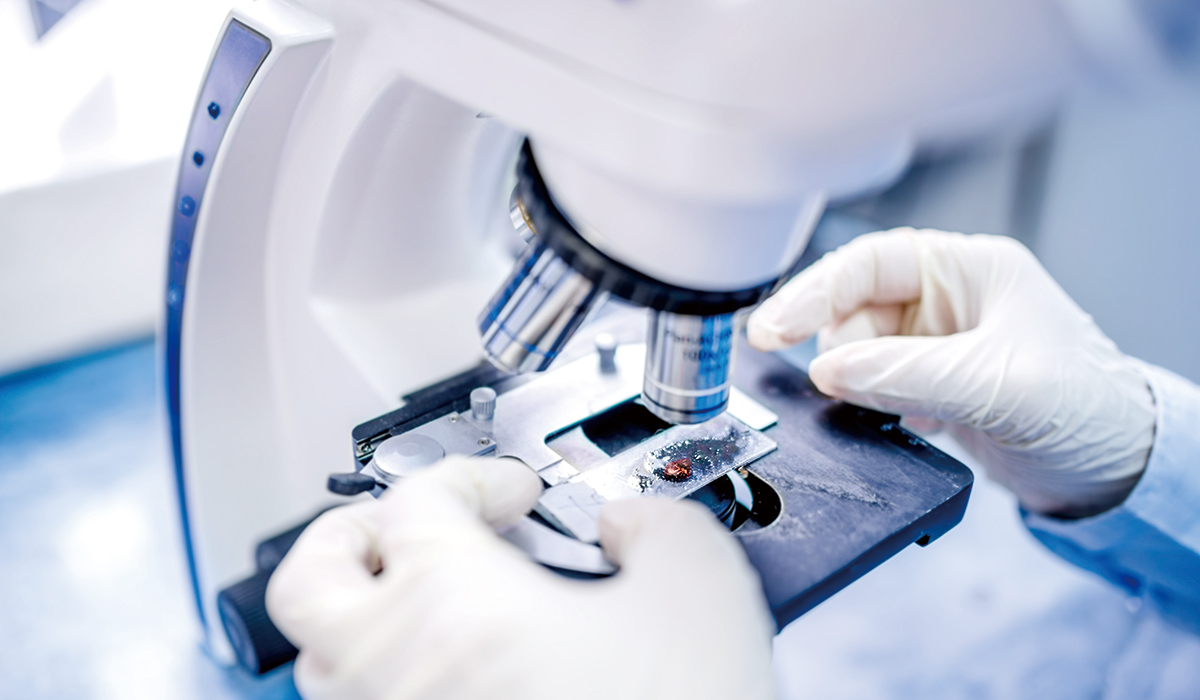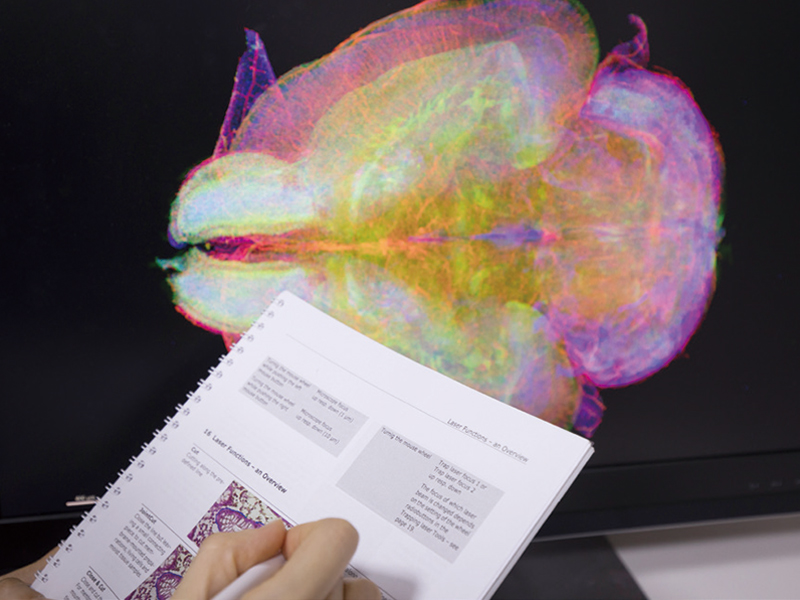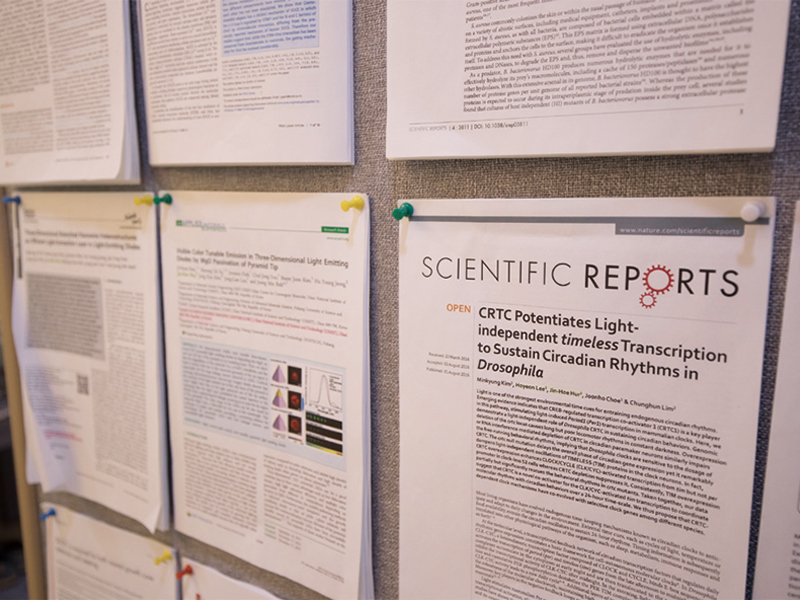
- INSIDE
- Special Theme _BIOMEDICAL
본문영역
Biomedical engineering will innovate future medicine!
In 2020, UNIST established the College of Information and Biotechnology. The Department of Biomedical Engineering, together with the Departments of Electrical Engineering, Computer Engineering, Industrial Engineering, Design, and Life Sciences, and the Graduate School of Artificial Intelligence, has applied cutting-edge technologies faster than anyone else, rapidly growing into the “First Mover” in the global competition.- Written by Professor Bae Seong-cheol, Department of Biomedical Engineering

Innovation in medicine goes hand-in-hand with the rapidly advancing science and technology
Innovation in modern medicine and medical care is never irrelevant to the advancement of science and technology. The invention of the microscope made it possible to observe tissues, cells, and microorganisms; the discovery of X-rays made it possible to look inside the human body without having to resort to dissection; and our understanding of nuclear magnetic resonance and the development of computers and electronic engineering made the development of the MRI 3D medical imaging system possible.
As a closer example, the recent COVID-19 pandemic has made us realize how the rapid development of diagnostic kits, vaccines, and treatments can revolutionize human life and the quality of life. The development of medical technology and medical services is dependent on knowledge from diverse fields of science and technology, such as mathematics, physics, chemistry, biology, electronic engineering, mechanical engineering, materials engineering, nuclear engineering, chemical engineering, and computer engineering.
Biomedical engineering can be considered a new discipline with a relatively short history compared to other science and technology fields. UNIST's Department of Biomedical Engineering is where twenty-five experts from various academic backgrounds gather to conduct education and research aimed at introducing innovations to healthcare and medicine based on known knowledge or technology in existing academic fields.
In addition to the Department of Biomedical Engineering, professors in many departments, including the Department of Life Science and the Department of Chemistry, are conducting basic research on life phenomena and the development of new drugs, drug delivery materials, and wearable sensors using them.
Driving innovation in various fields of medical education and research
Since science and technology are used for medical innovation, cooperation with other academic fields is essential for the Department of Biomedical Engineering. In particular, digital and engineering technologies, which have advanced rapidly in recent years, are expected to revolutionize medicine faster than any other field. In line with this trend, UNIST established the College of Information and Biotechnology in 2020, while the Department of Biomedical Engineering, along with the Departments of Electrical and Electronic Engineering, Computer Engineering, Industrial Engineering, Design, and Life Sciences, and the Graduate School of Artificial Intelligence, has introduced these cutting-edge technologies faster than anyone else, growing into the “First Mover” in the global competition.
To emphasize the point again, UNIST is conducting research and education for medical innovation in various fields. This article aims to introduce the activities currently taking place on campus based on the following key terms: 1) digital and artificial intelligence (AI), 2) translational study, and 3) global cooperation.
Digital transformation of healthcare sector with the advancement of digital technology
The Smart Healthcare Center was opened in 2021 to promote research and innovation in digital technology and AI in medicine. The advancement of digital technology has rapidly converted analog medical information into digital information. For example, X-ray images used to go through the process of film development, after which the film was placed on a bright white light panel so that a doctor could check it with the naked eye.
As such, this process required a lot of time to check the results, and the film had to be stored physically to preserve the data. Now, however, digital images are obtained using digital X-ray sensors immediately after filming, transmitted directly to doctors, and stored by a standardized PACS (Picture Archiving and Communication System).
Patients and doctors can see X-ray results immediately as they no longer have to wait for the film to be developed and delivered. Moreover, AI technology is being applied in various ways in order to increase doctors' reading speed and accuracy in the field of image reading. In addition to medical images, the digitization of patients’ medical information in various forms enables more accurate and safer treatment at any hospital, as patients' medical records and medication information can be accessed in an instant.
Cooperation with hospitals and medical schools that provides an environment where exceptional clinical training occurs
Digitized medical information has opened up new and previously unimaginable possibilities. AI analysis of medical information is also used in the development of new drugs and the verification of new drugs’ efficacy, opening up possibilities for new methods of treatment. Furthermore, the easy transmission of medical information makes non-face-to-face treatment possible without having to visit a hospital.
Although there are still some regulatory issues to be resolved in this area, our experiences during the COVID-19 pandemic have shown us that it is already technically possible. The digitized medical service can extend the scope of medical care beyond the physical limits of hospitals and the scope of disease diagnosis and treatment to include medical care in everyday life.
As Korea has a rapidly aging population, healthcare services that can improve the quality of life beyond simple diagnosis and treatment are emerging as a new industry of the future. To this end, the UNIST Smart Healthcare Center focuses on developing new services by developing and testing newly developed biometric centers, accumulating bio-signals, and acquiring and analyzing medical and biometric data. Due to the development of data domains and engineering technology, the development of new methods of diagnosis and treatment for the rapid and accurate application of tools and equipment currently used in clinical practice is also in progress.
One of the essential elements in such medical innovation research consists in identifying the demands of the clinical field and R&D that meets those needs. Accordingly, UNIST is currently collaborating with leading hospitals in Korea, and is engaged in close cooperation with the Colleges of Medicine of Yonsei University and the University of Ulsan, Yangyang Hospital of Busan National University, and the Dongnam Institute of Radiological & Medical Sciences.
UNIST has executed eleven joint research projects on the human genome, medical imaging, and digital healthcare with Yonsei University’s College of Medicine since 2021. It also plans to organize classes in which medical and engineering students from Ulsan University’s College of Medicine will participate, and will pilot project-based courses starting this fall.
UNIST, together with Ulsan University College of Medicine, which boasts outstanding research personnel, designed a cooperative program with hospitals and medical schools with excellent clinical experience by benchmarking the HST (Health Science and Technology) program involving Harvard University and MIT. UNIST plans to open the Graduate School of Medical Science for full-scale cooperation this autumn. The School focuses on rapidly applying advanced science and technology to clinical practice, and plans to nurture medical scientists and engineers and conduct rapid R&D and education in cooperation with engineers.
UNIST’s Biomedical Global Talent Nurturing Program
Lastly, it is essential for these medical innovations to compete in the global market. As medicine and medical care inherently deal with human life, only the best technology can survive in the field. Accordingly, UNIST is forging cooperative links with leading global institutes.
Under the Global Biomedical Talent Nurturing Program, UNIST has, over the past three years, dispatched about thirty graduate students and postdoctoral researchers to the world's best universities and hospitals to conduct joint research, and it plans to expand the joint international research by continuing to dispatch personnel overseas. Institutes to which UNIST has dispatched its personnel include Stanford University, MIT, Caltech, and UCLA University Hospital.
In particular, UNIST has discussed with UCLA University Hospital the possibility of promoting research cooperation and exchanges of personnel in the field of medical data, as well as various forms of support and cooperation for domestic biomedical start-ups to enter the US market, and has also discussed the possibility of expanding the program with UC San Diego, University of Illinois, UC Berkley, and Basel University Hospital in Switzerland. UNIST continues to promote challenging research with the dream of leading innovation on the global stage by utilizing the best science and technology in Korea.
Biomedical




